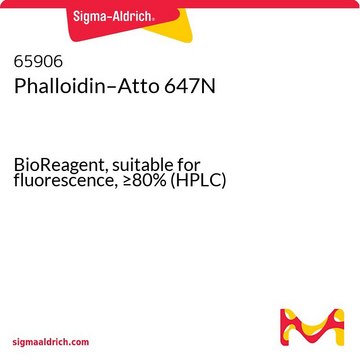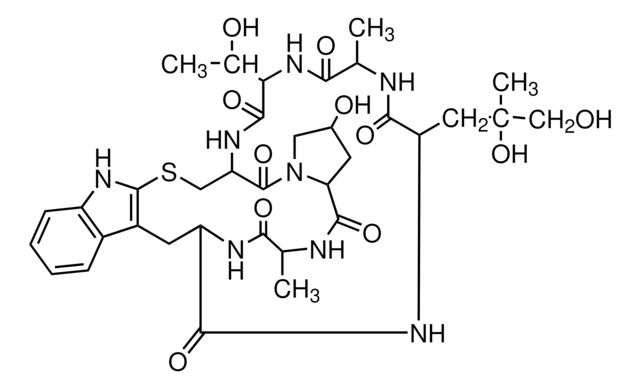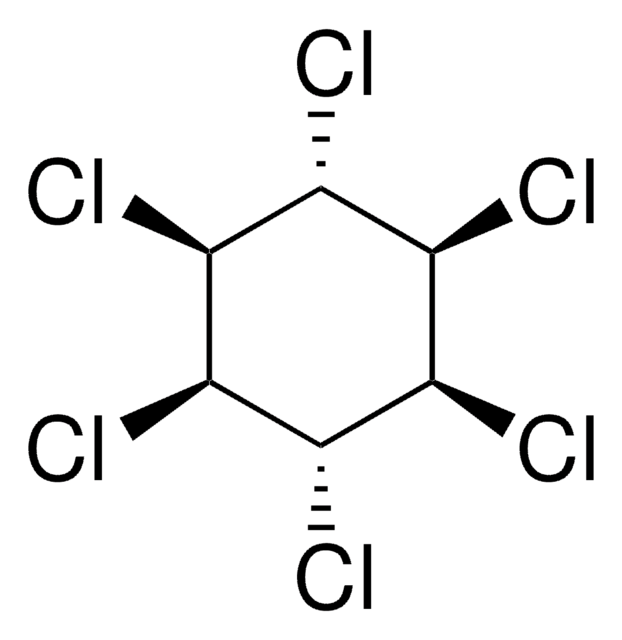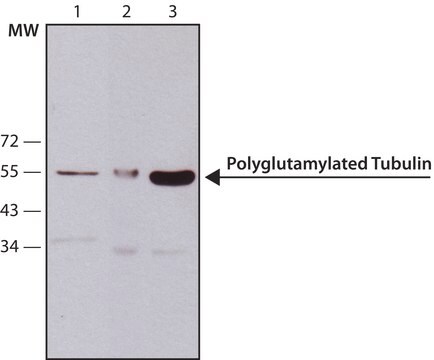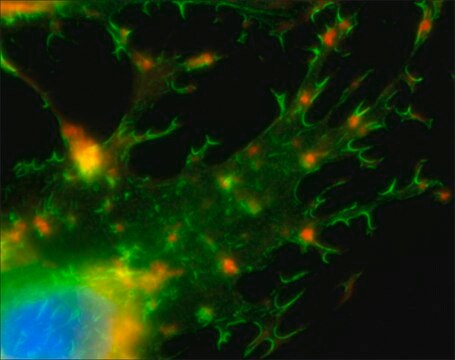Wszystkie zdjęcia(1)
Kluczowe dokumenty
68825
Phalloidin–Atto 633
suitable for fluorescence, ≥90% (HPLC)
Zaloguj sięWyświetlanie cen organizacyjnych i kontraktowych
About This Item
Kod UNSPSC:
12352108
NACRES:
NA.32
Polecane produkty
Poziom jakości
Próba
≥90% (HPLC)
Formularz
solid
masa cząsteczkowa
Mw 1434 g/mol
producent / nazwa handlowa
ATTO-TEC GmbH
λ
in methanol
absorpcja UV
λ: 629-635 nm Amax
przydatność
suitable for fluorescence
temp. przechowywania
−20°C
Opis ogólny
Atto 633 belongs to a new generation of fluorescent labels for the red spectral region. The dye is designed for application in the area of life science, e.g. labelling of DNA, RNA or proteins. Characteristic features of the label are strong absorption, high fluorescence quantum yield, high photostability, good water solubility, and very little triplet formation. Atto 633 is a cationic dye. After coupling to a substrate the dye carries a net electrical charge of +1. In common with most Atto-labels, absorption and fluorescence are independent of pH, at least in the range of pH 2 to 11, used in typical applications.
Phalloidin is a fungal toxin isolated from the poisonous mushroom Amanita phalloides. Its toxicity is attributed to the ability to bind F actin in liver and muscle cells. As a result of binding phalloidin, actin filaments become strongly stabilized. Phalloidin has been found to bind only to polymeric and oligomeric forms of actin, and not to monomeric actin. The dissociation constant of the actin-phalloidin complex has been determined to be on the order of 3 x 10-8. Phalloidin differs from amanitin in rapidity of action; at high dose levels, death of mice or rats occurs within 1 or 2 hours. Fluorescent conjugates of phalloidin are used to label actin filaments for histological applications. Some structural features of phalloidin are required for the binding to actin. However, the side chain of amino acid 7 (g-d-dihydroxyleucine) is accessible for chemical modifications without appreciable loss of affinity for actin.
find more information here
Phalloidin is a fungal toxin isolated from the poisonous mushroom Amanita phalloides. Its toxicity is attributed to the ability to bind F actin in liver and muscle cells. As a result of binding phalloidin, actin filaments become strongly stabilized. Phalloidin has been found to bind only to polymeric and oligomeric forms of actin, and not to monomeric actin. The dissociation constant of the actin-phalloidin complex has been determined to be on the order of 3 x 10-8. Phalloidin differs from amanitin in rapidity of action; at high dose levels, death of mice or rats occurs within 1 or 2 hours. Fluorescent conjugates of phalloidin are used to label actin filaments for histological applications. Some structural features of phalloidin are required for the binding to actin. However, the side chain of amino acid 7 (g-d-dihydroxyleucine) is accessible for chemical modifications without appreciable loss of affinity for actin.
find more information here
Informacje prawne
This product is for Research use only. In case of intended commercialization, please contact the IP-holder (ATTO-TEC GmbH, Germany) for licensing.
Ta strona może zawierać tekst przetłumaczony maszynowo.
Kod klasy składowania
11 - Combustible Solids
Klasa zagrożenia wodnego (WGK)
WGK 3
Temperatura zapłonu (°F)
Not applicable
Temperatura zapłonu (°C)
Not applicable
Wybierz jedną z najnowszych wersji:
Masz już ten produkt?
Dokumenty związane z niedawno zakupionymi produktami zostały zamieszczone w Bibliotece dokumentów.
Klienci oglądali również te produkty
Heather M Weber et al.
Acta biomaterialia, 57, 59-69 (2017-05-21)
Dialysis or kidney transplantation is the only therapeutic option for end stage renal disease. Accordingly, there is a large unmet clinical need for new causative therapeutic treatments. Obtaining robust models that mimic the complex nature of the human kidney is
Krishna Chander Sridhar et al.
Cell communication and signaling : CCS, 18(1), 191-191 (2020-12-30)
The electromechanical function of myocardial tissue depends on the intercellular communication between cardiomyocytes (CMs) as well as their crosstalk with other cell types. Cell injury, and subsequent death trigger inflammation as in myocardial infarction (MI) resulting in myocardial remodeling. Although
Danielle Park et al.
Nature materials, 19(2), 227-238 (2019-10-30)
The isotropic or anisotropic organization of biological extracellular matrices has important consequences for tissue function. We study emergent anisotropy using fibroblasts that generate varying degrees of matrix alignment from uniform starting conditions. This reveals that the early migratory paths of
Marco Montagner et al.
Nature cell biology, 22(3), 289-296 (2020-02-26)
The process of metastasis is complex1. In breast cancer, there are frequently long time intervals between cells leaving the primary tumour and growth of overt metastases2,3. Reasons for disease indolence and subsequent transition back to aggressive growth include interactions with
Produkty
Barwniki Atto to seria barwników fluorescencyjnych, które spełniają krytyczne potrzeby nowoczesnych technologii fluorescencyjnych.
Nasz zespół naukowców ma doświadczenie we wszystkich obszarach badań, w tym w naukach przyrodniczych, materiałoznawstwie, syntezie chemicznej, chromatografii, analityce i wielu innych dziedzinach.
Skontaktuj się z zespołem ds. pomocy technicznej